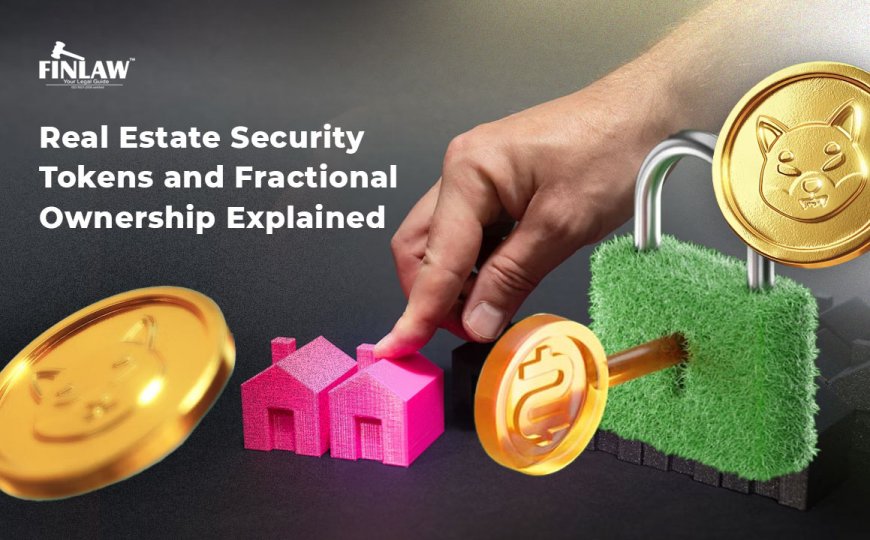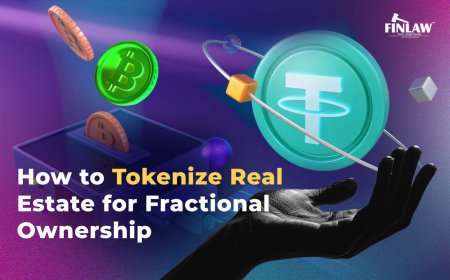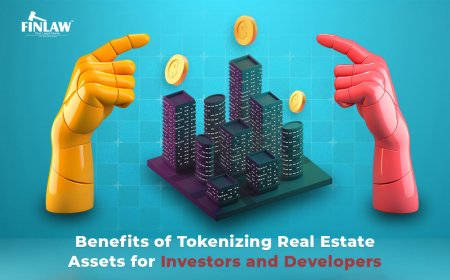Real Estate Security Tokens and Fractional Ownership Explained
Discover how real estate security tokens work in India. Learn about fractional ownership, benefits, risks, taxation, and regulatory outlook for investors and developers.

The Indian real estate market is projected to reach USD 1 trillion by 2030, driven by rapid urbanization, infrastructure growth, and rising demand for housing. Yet, the sector remains plagued by barriers — high entry costs, lack of liquidity, and complex ownership structures.
Enter the real estate security token — a blockchain-powered innovation that promises to revolutionize property investment. By enabling fractional ownership and digital trading, security tokens make premium real estate more accessible, transparent, and liquid.
This article explains what real estate security tokens are, how they work, their benefits and risks, India’s regulatory picture, and how investors and developers can participate.
What is a Real Estate Security Token?
A real estate security token is a blockchain-based digital token backed by real-world property. It represents ownership or financial rights in a property or a legal entity (such as an SPV or trust) holding that property.
Unlike cryptocurrencies or NFTs, which are often speculative, security tokens are tied to regulated securities laws. They may grant holders:
-
A share in rental income.
-
Voting rights in property-related decisions.
-
Proceeds from property sales.
-
Equity-like ownership in an SPV.
Because everything is recorded on blockchain, ownership is transparent, secure, and easily transferable.
How Fractional Ownership Works
Fractional ownership through tokenization divides a property into small, tradable units. Each investor holds tokens equivalent to their ownership share.
Example:
A Grade A commercial building in Mumbai valued at ₹200 crore could be tokenized into 20 lakh tokens at ₹1,000 each. Instead of one institutional investor owning the entire property, thousands of smaller investors can collectively own portions of it.
This opens access to high-value properties—such as luxury residential projects, shopping malls, or office towers—previously reserved for HNIs (High Net-worth Individuals) or institutional investors.
Real Estate Security Token vs REITs: Key Differences
India already has Real Estate Investment Trusts (REITs), which also pool money from investors to buy real estate. However, there are critical differences:
|
Feature |
Real Estate Security Token |
REIT |
|
Ownership |
Direct fractional ownership of a property or SPV |
Indirect ownership via pooled trust structure |
|
Liquidity |
Can be traded 24/7 on tokenized exchanges (where allowed) |
Listed only on stock exchanges |
|
Accessibility |
Lower entry point (₹1,000–₹10,000 possible) |
SEBI mandates minimum investment (₹10,000–₹15,000 currently) |
|
Transparency |
Blockchain-based, tamper-proof records |
Traditional disclosures, periodic reporting |
|
Global Investors |
Can allow cross-border participation (subject to FEMA/RBI) |
Limited to Indian stock market participants |
Conclusion: While REITs are a step forward, real estate security tokens offer greater flexibility, accessibility, and global reach.
Benefits of Real Estate Security Tokens
-
Democratized Access – Small investors can access premium real estate.
-
Enhanced Liquidity – Token marketplaces allow faster exits compared to traditional sales.
-
Global Participation – Subject to compliance, international investors can participate in Indian real estate markets.
-
Automated Processes – Smart contracts reduce paperwork and manual reconciliations.
-
Increased Transparency – Blockchain prevents manipulation of ownership records.
-
Efficient Fundraising for Developers – Tokenization provides an alternative to bank financing or private equity.
Risks and Challenges
Despite the benefits, investing in real estate security tokens comes with risks:
-
Regulatory Grey Area – No dedicated Indian law for security tokens yet.
-
Market Adoption – Liquidity depends on active token exchanges and investor interest.
-
Custody Risks – Loss of private keys or platform hacks can result in asset loss.
-
Valuation Concerns – Poorly managed valuations could misrepresent asset worth.
-
Tax Complexity – Capital gains and GST implications require clarity and careful structuring.
Regulatory Outlook in India
India has not yet released a dedicated framework for real estate security tokens, but existing laws may apply:
-
SEBI – If tokens are classified as securities, SEBI regulations will govern disclosures, fundraising, and trading.
-
RBI/FEMA – For foreign investors, FEMA compliance and RBI approvals are critical.
-
IFSCA (GIFT City) – The International Financial Services Centres Authority is exploring tokenized securities in controlled sandboxes.
-
Taxation – Gains from token trades are likely subject to capital gains tax. In some cases, GST may apply to token issuance or management fees.
Note: As of 2025, most tokenized offerings in India are routed through GIFT City (IFSC) or offshore structures to remain compliant.
Global Case Studies of Real Estate Tokenization
-
Aspen Coin (USA): A luxury hotel in Colorado was tokenized, allowing fractional ownership by global investors.
-
St. Regis Aspen (USA): Tokenized through blockchain to raise funds and enable partial ownership.
-
Germany & Switzerland: Regulators have enabled pilot programs for tokenized property securities.
-
Singapore: Licensed platforms already allow fractional real estate tokenization within regulatory frameworks.
These examples show how India could unlock global capital for its property sector by adopting a similar legal framework.
Taxation of Real Estate Security Tokens in India
While Indian regulators are still clarifying the tax treatment, here’s what is likely:
-
Capital Gains Tax: Sale of tokens may be treated like securities transactions, attracting short-term or long-term capital gains tax.
-
Stamp Duty: Transfer of underlying property still attracts stamp duty at the state level.
-
GST: Depending on structure, GST may apply to token issuance or management services.
-
Foreign Investors: FEMA restrictions and double taxation treaties (DTAA) come into play for cross-border participation.
Investors should always consult a tax advisor before participating.
Future of Real Estate Security Tokens in India
The future looks promising but cautious:
-
Short Term (1–3 years): Pilot projects through IFSCs, private placements for HNIs and institutions.
-
Medium Term (3–5 years): Regulatory sandboxes and SEBI’s involvement may open tokenized real estate for broader investors.
-
Long Term (5–10 years): Widespread adoption, integration with REIT-like structures, and global investor participation.
With India’s digital-first economy, once regulators provide clarity, real estate security tokens could become as mainstream as REITs.
Frequently Asked Questions (FAQ)
Q1: What is a real estate security token in India?
It is a blockchain-based token that represents fractional ownership or economic rights in Indian property, regulated as a security.
Q2: Is investing in real estate security tokens legal in India?
Yes, but only if structured under existing SEBI, FEMA, and tax regulations. GIFT City is emerging as the most compliant hub.
Q3: How is it different from a REIT?
REITs are stock market-listed vehicles pooling investor money, while security tokens directly fractionalize property ownership via blockchain.
Q4: What taxes apply to real estate security tokens?
Capital gains tax, stamp duty (on underlying property), and possibly GST depending on token structure.
Q5: Can foreign investors buy Indian real estate tokens?
Yes, but only through FEMA-compliant structures, often routed via IFSCs or offshore SPVs.
Conclusion
The real estate security token is redefining property investment in India by merging real-world assets with blockchain technology. It offers fractional ownership, global participation, and improved liquidity—making real estate more inclusive and efficient.
However, regulatory uncertainty, tax complexities, and market adoption remain challenges. As India continues to modernize its financial ecosystem, security tokens could unlock billions in global capital for the real estate sector.
For now, both investors and developers should tread carefully, work with legal and compliance experts, and explore tokenization through regulated hubs like GIFT City until nationwide clarity emerges.
What's Your Reaction?



















